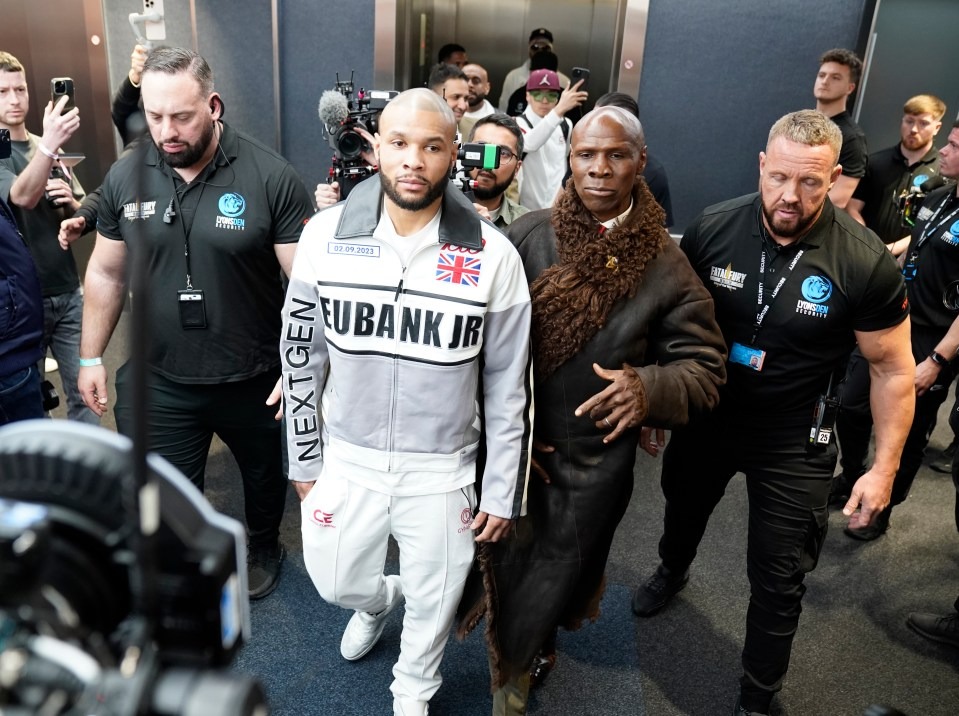Eubank Jr v Benn lives up to the hype, but no rematch is needed

Saturday night at the Tottenham Hotspur Stadium provided a rare occasion of a fight perhaps even exceeding its hype, as Chris Eubank Jr overcame Conor Benn by unanimous decision to make it 2-0 to the Eubanks in a 25-year-long rivalry with the Benns. It was a match-up that garnered instant attention due to the two classics served up by Chris Eubank Snr and Nigel Benn in the early 1990s, but which, outside of the family rivalry, made little initial sense.
Conor Benn was a career welterweight (other than two underwhelming outings at 154lbs) jumping up two weight divisions to take on a man seven years his senior who should be targeting a final world title shot. Benn’s resume simply did not compare to Eubank Jr’s who, although lacking an elite level win, had proven his credentials in competitive bouts with Billy Joe Saunders and George Groves.
But this is boxing, where money talks and where you should expect the unexpected. And the two fighters honoured their fathers’ names to produce an instant classic in front of 65,000 at a packed out arena. Benn never stopped pressing forward in a pulsating contest which the 28-year-old looked to be edging, before a strong finish by Eubank Jr clinched the bout 116-112 on all three judges’ scorecards.
Inevitably, there were instant calls for a rematch, with a clause already in place to do it all over again in September later this year. But after a fractious build up which saw concerns about Eubank Jr’s struggles to make the 160lbs limit and Benn’s jump up to face a much naturally bigger man, boxing matchmakers must ask if it is really wise to opt for a repeat.
Boxing has an obsession with rematch clauses. Generally seen as a way to protect the favourite from the fallout of a shock defeat by guaranteeing an instant attempt at redemption, rematch clauses have evolved into an almost ever-present element of any big fight. And, of course, they can prove to be worthwhile. Tyson Fury obliterated Deontay Wilder when they fought for the second time in February 2020. Noone thought a rematch was needed, but after Wilder triggered the clause they met again in October 2021 and produced a thrilling ding-dong of a heavyweight contest which involved both boxers hitting the canvas multiple times before Fury’s 11th round victory.
And rematch clauses do serve a purpose. After Benn v Eubank 2 was controversially adjudged a draw in 1993, Benn claims a third fight never materialised because of Eubank, despite both men fighting on for 3 and 5 years respectively. A rematch clause accounting for a draw or Benn win (which would’ve made it 1-1) could’ve ensured a definitive ending to the rivalry.
But often, rematch clauses simply serve to stall careers or repeat an already emphatic result. When Anthony Joshua lost to Oleksander Usyk in September 2021, the difference in levels between them was clear for all to see. Joshua improved in the rematch, but it never looked likely to be enough against an all-time great who far surpassed Joshua in skills and boxing IQ and instead held up three of the belts for almost a year.
Rematches also sometimes risk a fighter's health, when the initial outcome should've prompted a realisation the match up was a stylistic nightmare. When Joe Joyce suffered the first defeat of his career via TKO to Zhilei Zhang, the rematch only proved more decisive, as a 6th round stoppage became a brutal round 3 KO.
Of course, some of the greatest fights of all time are rematches or trilogy fights. Rematches turn legendary fights into legendary rivalries, with the likes of Muhammad Ali and Joe Frazier, the “four kings”, Micky Ward and Arturo Gatti, and Canelo Alvarez and Gennady Golovkin, producing multiple unforgettable fights. But often, a clause itself isn’t needed when the money and public clamour is so high. Even in the case where its the underdog who finds themselves on the wrong end of a decision, these two factors can lead to a rematch. Groves didn’t have a rematch clause for his fight with Carl Froch. But there could be no denying it required a rerun, after a controversial stoppage potentially denied the Londoner one of the greatest upsets in the modern era. Froch claimed the stoppage was fair, but public demand combined with a huge purse persuaded him to sign on to fight Groves again. The rematch settled the rivalry, with Froch producing a one punch knockout in round 8.
Eubank Jr v Benn provided a magnificent spectacle. Conor Benn proved he has what it takes to challenge for the belts at 147lbs or 154lbs, while Eubank Jr showed he might just have one more massive fight left in him up at super-middleweight. Everything went perfectly for a fantasy fight no one thought was possible when a slight Conor Benn turned professional in 2016. The Eubanks were reunited in a genuinely heartwarming moment. The ring walks were spine tingling. And both fighters emerged with their health intact despite their respective challenges in cutting and coming up in weight.
With the Eubanks now 2-0 ahead and Chris Jr surely in the twilight of his career there is simply no need for a rematch. The drama of the whole event from its initial announcement in 2022 won’t be matched and it will hold up both fighters’ world title aspirations. Benn, although having time on his side, might not be able to make welterweight for much longer, while Eubank Jr surely doesn’t have much longer at the top level. A rematch only stands to serve the wallets of those involved. On a sporting level, it serves no one.
0 Comments Add a Comment?